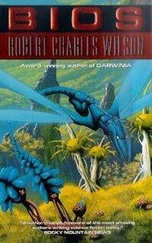“I left home,” he said. “I traveled a lot. I took a lot of jobs over those years. And I did some other kinds of traveling, too. But I always ended up back here… because I was familiar here; I know how to get along. Got along well enough—most of the time. But I had the same troubles you did. The Gray Man—I would see him sometimes. And more than that. Maybe you felt it, too… like being homesick for some place you’ve never seen. I swear I never did feel like I belonged here.”
Karen saw Michael nodding fractionally.
“So,” Tim said, “well, eventually I started drinking. And pretty soon that became a problem. I was in hospitals a couple of times. And then I figured out what you two seem to have figured out—that this is not something you can run away from.” His lips compressed into a tight, grim smile. “We can run farther and faster than anyone, right? But not away.”
Laura said, “So what’s the alternative?”
“To stop running away, “ Tim said, “and start running to.”
“Meaning—?”
He said, “I found the Gray Man and I followed him.”
There was another silence in the car.
“I’d done it before,” Tim went on. “When we were kids. When I didn’t know what he wanted. When I trusted him. You remember that night in the ravine —the old city on the coast?”
“Yes,” Karen said, involuntarily.
Tim said, “Well, that’s where he comes from.”
But she had guessed as much.
He added, “That’s where we come from.”
She sat forward, wanting to deny it.
“It makes sense,” Tim said. “Like it or not. Whatever we are, the Gray Man is one of us. You can’t get away from that. There’s this trick we can do, and no one else in the world can do it… except him. What does that suggest?”
Laura said, impatiently, “What did you find out?”
“We’re related,” Tim said. “We’re family. The connections are kind of strange, but the closest you can get to it is—you might think of him as an uncle.”
Michael listened to Tim’s description of the Gray Man’s world with increasing interest.
It was where they had come from (Tim said), and it was where they had been created. In an important sense, it was the only real home they had or would ever have.
It was not, he said, necessarily a good place. It was like this world: not distinctly good or bad but a little of both. It was not a Utopia, but who believes in Utopias? You had to take it on its own terms.
Things were different there.
History had happened a little differently. Rome and the Roman Church still dominated Europe; America had won its independence and had become a refuge for Europe’s oppressed Protestants. It was not called the United States but the Novus Ordo, the New Order of the Americas, a major military and economic power. Rome had been jealous of the Novus Ordo for two centuries, but now there was a bigger threat: the militant Islamic nations of the Middle East and Africa.
The Novus Ordo, a heretical nation, was able to experiment with forces the Church wouldn’t touch. Alchemy, kabalistic magic, astrology—it was all very different there, all very real. It was the Americans who first understood that the ability to walk between worlds might exist, that it might be a potent and accessible power. Maybe in the past it had occurred randomly, a wild talent in people who might never suspect they possessed it, who dreamed themselves haphazardly out of the world, or who used it to escape their families or their creditors. Now it was possible to identify those people, bring them together, take this thing to the limit.
Not necessarily as a weapon—though that implication was there, too—but as research. A learning tool.
That’s where we came from, Tim said … or at least, that’s where our parents came from.
Our real parents.
Michael said, “And the Gray Man.”
“He’s a failed experiment,” Tim said. “He’s insane.”
Karen said, “He’s hunting us. He’s been hunting us all our lives. And he killed our parents.”
They walked along the sea grass on this promontory, the three adults and Michael.
“Also the girl on the beach,” Michael said. “I saw that. He just pushed her away—like killing a bug.”
“It was never meant to happen that way,” Tim said quietly.
“All these years,” Karen said, “hunting us, finding us sometimes… you would think, if he meant to kill us, he would have.”
Tim said, “I don’t understand all his motives. But we’re maybe not as easy to kill as those others. Our parents trusted him. He was a brother to them. So he could get close without suspicion. None of us ever felt that way.”
Laura said, “Except you. You did.”
Tim looked at her quizzically.
“That night in the ravine,” she said, “in the alley. You talked to him like you knew him. If he had wanted to, Tim, he could have killed us all right then.”
Tim said, “I think he wanted our trust.”
“He seemed to have yours.”
“I never spoke to him after that.”
“And the things he gave us. Those toys. You know Mama and Daddy still have them stashed in a drawer? And the things he said. I always wondered about that. It was like a curse or an omen or something.”
“Insanity,” Tim said.
“You sound so sure of that.”
“I talked to people,” he said.
“People in that place—the Novus Ordo?”
“Important people.”
“You just waltzed in and had a chat?”
“I established who I was.”
“We’re talking about what, a military project of some kind?”
“Research,” Tim said.
“And they let you walk out again?”
“They understood,” Tim said, “that they couldn’t stop me.”
“And you believed what they told you?”
“There’s no reason not to.”
Laura shook her head. “If this is true,” she said, “then they want something. They must. Just like the Gray Man wants something.”
“I talked to a man called Neumann,” Tim said. “A real flesh-and-blood human being—not a monster. Nothing supernatural. He’s operating what they call the Plenum Project. Sure, of course they want something from us. They need our help. So in a way I’m carrying that message. But, Christ, Laura, there’s more to it than that. It’s home. You understand? It’s a place to belong.” He looked at her intently. “Don’t you miss that? Haven’t you ever wanted that?”
“If it’s home,” Karen said—thinking now of what Willis had told her—“why did our parents leave?”
“They were running from Walker, not the Project.”
“But you said they trusted him. That’s how he killed them.”
“They were afraid of him. But he was still family. They loved him.” He scuffed a rock down this grassy incline toward the bay. “Hey, it happens, you know. People love people who want to hurt them. It’s possible.”
They dropped Tim off at a BART depot and drove back to the hotel. Time enough to talk again tomorrow. In the meantime there was plenty to think over.
Laura ordered up room service and Michael occupied the big chair by the window, ignoring a club sandwich, picking out barely audible chords on the Gibson guitar he’d carried across the country and farther. It was pretty obvious to Michael—listening to his aunt and his mother trying to sort all this out—that the appearance of Tim had thrown them for a loop. It wasn’t what they’d expected.
Laura said, “He’s not telling the truth. Or all of the truth.”
“It’s been a long time,” Karen said. “It’s hard to judge.”
Читать дальше












